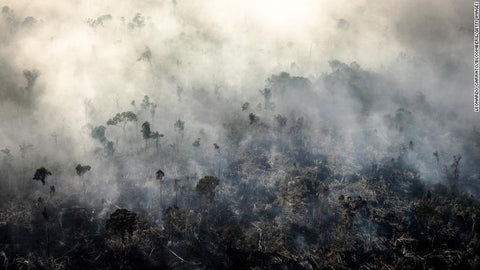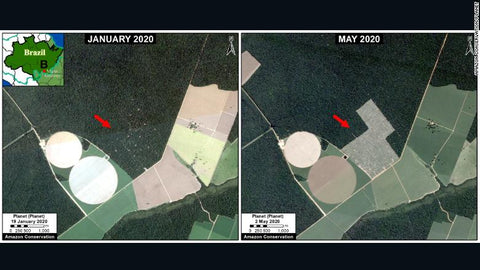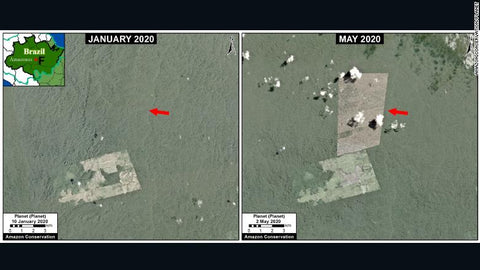Scientists fear deforestation, fires and Covid-19 could create a 'perfect storm' in the Amazon

New data shows that fires in the Brazilian Amazon are on track to be just as bad as last year, if not worse, with an estimated 150,000 hectares of land deforested so far in 2020 at risk.
The Monitoring of the Andean Amazon Project (MAAP), an initiative of the group Amazon Conservation, has used an archive of satellite data to track deforestation across the Brazilian Amazon and found that most of last year's fires occurred on recently deforested land, rather than in primary forest. Deforested land is often intentionally burned to clear it for farming and cattle ranching.
So far this year, MAAP has detected several large areas in the state of Mato Grosso that have been recently deforested, and could be the sites of fires later this year.
"Fire season doesn't start out of nowhere in August -- it started a year ago with deforestation," said Matt Finer, senior research specialist and the director of MAAP. He says their research suggests this year's fires will be "as bad if not worse" than last year's. "We need the intensity of the rage and concern that people had back in August, we need that now to ratchet up the urgency of the situation."

New satellite data analyzed by Amazon Conservation shows the extent of deforestation so far in 2020.
Finer and his team used a new method combining data from heat-tracking satellites with data monitoring levels of particles in the atmosphere to give a more accurate picture of where forest fires occur. They have developed an app to track the fires in real-time and hope it will be of use to firefighters on the ground to focus resources over such vast areas.
Satellite data from NASA indicates this year could be another dry year for the forest, increasing the risk of fires spreading from deforested land into primary forest.

The first quarter of 2020 has seen a sharp increase in deforestation, estimated by MAAP to be around 150,000 hectares so far this year.
The increase in deforestation, combined with dry weather conditions and the challenges posed by Covid-19 have all converged to create a "perfect storm" for fires this summer, according to a recent report from the nonprofit Amazon Environmental Research Institute (IPAM).
As the Amazon burns, humans are to blame
Natural forest fires in tropical forests such as the Amazon are extremely rare due to high levels of humidity. That means humans are responsible for most of the recent destruction.
"All the fires we have seen in the Amazon have been set. Unlike some other forest systems that are dependent on fires, such as in California, Florida or Australia, the Amazon doesn't burn naturally," said Ane Alencar, IPAM's director of science in a press conference on Wednesday run by Columbia University's Earth Institute.
Last year's devastating fire season drew global attention to the plight of the Amazon and President Jair Bolsonaro's controversial dismantling of many of the state protections for the rainforest and indigenous lands. Under intense domestic and international pressure, the Brazilian Army was sent last year and again this year to protect the forest.
The move has had some success, Alencar said, but has not succeeded in combating the root cause -- deforestation.
According to Brazil's National Institute for Space Research (INPE), deforestation has risen by over 50% in the first quarter of 2020.
These newly deforested areas, combined with ones that were cleared last year, leave a potential burn area of over 4,500 square kilometers -- roughly three times the size of greater London.
"Around half the deforestation that we have seen so far is happening on public lands, which means that people are going after and grabbing the land and provoking conflicts, which is illegal," says Alencar. "This can only be fought by strong enforcement and strong signals from the government that illegal deforestation is not allowed."
The Brazilian government has authorized the hiring of 1,481 temporary workers to help fight the fires. It also deployed thousands of soldiers beginning in May in an operation in the western state of Rondonia, near the Bolivian border, in an effort to fight deforestation ahead of the fire season.
Brazilian Vice President Hamilton Mourão has said the government will establish permanent bases for military, police and enforcement officials in the Amazon this year and that a plan is in place to combat deforestation and this year's fires.
Coronavirus is devastating Brazil's indigenous communities
Brazil has one of the world's worst Covid-19 outbreaks, with almost one million cases so far, second only to the United States.
Indigenous communities living in the Amazon region have been especially hard hit by the virus, with a mortality rate of twice that the rest of the population, according to Articulation of the Indigenous Peoples of Brazil (APIB), an advocacy group which has been tracking cases and deaths amongst indigenous people in Brazil.
This year, the risk of respiratory diseases due to air pollution from fires could exacerbate the impact of Covid-19, particularly for indigenous people whose lands may be nearer the fires. Such was the warning from former president of the U.S. Institute of Medicine and dean of the Harvard Chan School of Public Health, Dr Harvey Fineberg, at the press briefing.
Recent studies suggest a link between exposure to air particle pollution and more severe cases of coronavirus, and seasonal increases in malaria and dengue in the Amazon over the summer will put additional pressure on remote regions where hospital beds are hard to come by, according to Marcia Castro, chair of the Department of Global Health and Population at Harvard's T.H. Chan School of Public Health.
She also warned that the health risks of the fires are not limited to the Amazon.
"The particulates from the forest fires can travel to other areas," Castro said at the press conference. "As cities relax social distancing measures in Brazil without adequate surveillance, testing and contact tracing, as we are seeing, an intense fire season could have devastating public health consequences, with the unnecessary loss of many lives and the widening of local inequalities."
As the eyes of the world remain focused on the pandemic, it remains to be seen whether the plight of the Amazon will receive the same attention that it did last year.
But Alencar says international pressure is key to tackling this problem.
"How international communities can help is to put pressure on the companies that buy products from the agribusinesses [and by] pressing the government to respect this amazing patrimony that we have, which is the forest."
